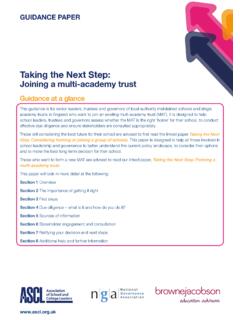Transcription of Continuous Professional Development of Teachers: A Case of ...
1 Bulletin of Education and Research December 2019, Vol. 41, No. 3 pp. 119-130 Continuous Professional Development of Teachers: A Case of Public Universities in Pakistan Muhammad Dilshad*, Bashir Hussain** and Humera Batool** _____ Abstract This research aimed at investigating university teachers engagement in CPD activities, perceived importance of different CPD activities, skills to be focused in future training and barriers in Professional Development of teachers. Comparison of teachers opinions was also made by gender and discipline. A self-developed questionnaire was administered to 700 conveniently selected teachers that belonged to four faculties. The data were analyzed by applying descriptive statistics including frequency of responses, mean scores and standard deviation, and t-test of independent samples for comparing views of respondents from different groups.
2 The results showed that teachers were moderately engaged in all the fifteen Professional Development activities included in the questionnaire. Producing research papers, reviewing articles for journals, and developing teaching and learning materials were activities rated highly important by teachers. There was no significant difference in male and female teachers opinions about their involvement in CPD activities. However as compared to teachers of social sciences, teachers of science disciplines were more involved in CPD activities. The respondents considered communication skills, management skills and research skills important for inclusion in their future training. Time, funding and un-availability of study leaves were major barriers that affected Continuous Professional Development of teachers.
3 It was suggested that Professional Development of university teachers may be taken as ongoing process. For helping teachers improve their academic and research skills, workshops and seminars must be frequently planned and organized by the universities. Keywords: Professional Development , Professional Development activities, academic skills, communication skills, research skills *Associate Professor, Department of Education, Bahauddin Zakariya University Multan. Email: ** Assistant Professor, Department of Education, BahauddinZakariya University Multan. ** Scholar, Department of Education, The Islamia University of Bahawalpur. Pakistan CP Development of Teachers: A Case of Public Universities in Pakistan 120 Introduction The importance of higher education cannot be denied for shaping the civilized nations.
4 Higher education plays central role in the training and provision of leaders for different spheres of life including government and other professions. The economic growth of any country is closely linked with the system of higher education which provides educated and skilled manpower for the national economy. Teacher is backbone of any institution including institutions of higher education if they have to materialize their visions and missions. The effectiveness of higher education institutions is largely dependent on the performance of teachers. For this reason, teachers must be trained and developed so that they may perform their duties efficiently and effectively. Throughout the world, teacher education programs are designed for providing educators with the certification and competencies required in their Professional careers (Rao, 2004).
5 In-service training opportunities deliberately created by the management of institutions ensure quality instruction and retention of high-quality faculty (Ali, 2008).Underlining the significance of Professional Development , Guskey (2002, p. 381) observes: high-quality Professional Development is a central component in nearly every modern proposal for improving education . Similarly Seyoum (2011) holds that the goal of educational reforms can only be achieved by ensuring that teachers are equipped with subject matter knowledge and an evidence-and-standards-based repertoire of pedagogical skills" ( ). Given the key importance of Professional Development programs for the successful realization of any educational transformation, the quality of learning activities for school staff is a major issue in both policy discussion and educational research (Wilson & Berne, 1999).
6 Professional Development of teachers refers to activities that develop teachers skills, knowledge, expertise and other characteristics as a teacher (OECD, 2009, ). Levin (2014) maintains that these days more appropriate alternate term for Professional Development is Professional learning, which is ongoing, often intensive, and always focused on improving student learning. (Levin, 2014).While defining the basic features of Professional Development , Day (1999) explains: Professional Development consists of all natural learning experiences and those conscious and planned activities which are intended to be of direct or indirect benefit to the individual, group or school, which contribute, through these, to the quality of education in the classroom.
7 It is the process by which, alone and with others, teachers review, renew and extend their commitment as change agents to the moral purpose of teaching; and by which they acquire and develop critically the knowledge, skills and emotional intelligence essential to good Professional thinking, planning and practice with children, young people and colleagues throughout each phase of their teaching lives ( ). Dilshad, Hussain & Batool 121 Continuous Professional Development (CPD) is a term employed to explain all the interventions in which teachers involve themselves during the course of their careers. CPD includes all practices which are needed to impact the classroom. The purpose of CPD is to enhance the work performance of educators in the classroom and increase learners academic achievement.
8 Effective Professional Development programmes engage teachers in learning events which are comparable to those they may employ with their pupils, and inspire them to create teachers learning forums. There is a rising trend in considering schools as learning organizations, which help teachers share their academic skills and practices in an organized fashion (Bacchus & Grove, 1996). It is observed that higher education institutions have inclination to consider formal courses as the most suitable mode of training intervention, but a different viewpoint has been taken by the practitioners (Becher, 1996). As indicated by the empirical evidence, Professional Development in tertiary education takes place extensively varied forms including discussions with colleagues, responding to student feedback and peer review, as well as more formal activities such as qualifications, workshops and conferences (King, 2004, p.)
9 27). Becher (1996, p. 54) has pointed out seven types or modes of Professional learning: Courses and conferences; Professional interactions; Networking; Consulting experts; Personal research; Learning by doing; and Learning by teaching . According to Levin and Lockheed (1993), developing nations such as Pakistan, are confronted with problems in provision of education facilities to their youth and there is a dearth of basic resources including trained and qualified educators. Apart from pre-service teacher education in Pakistan, there is a policy for in-service training of teachers at governmental level but opportunities for educators Professional Development are limited. The current teachers training provisions do not adequately meet the demands for quality education in school sector (Government of Pakistan, 1998).
10 However recently in Punjab province, Directorate of Staff Development (DSD) (now converted into Quaid- e- Azam Academy for educational Development ) has launched a rigorous programme of school teachers training under the CPD framework that includes induction training as well as short in-service training courses. In Pakistan pre-service training is not prerequisite for the entry to faculty positions in universities. According to Saleem, Masrur and Afzal (2014), there are no agreed upon instructional competencies for university teachers either at national or provincial level in Pakistan. The systematic mechanism for in-service training of university faculty is also missing. Aslam (2011) rightly points out that there is absence of effective Professional Development system at universities because universities in Pakistan have no appropriate human resource department that may design such policy.














